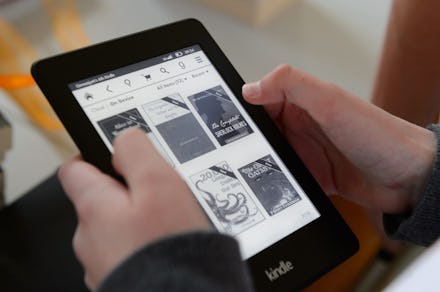Publishers are making it harder for you to get e-books from the library

Libraries have always been essential in providing public access to knowledge. And as e-books have become more popular, libraries have once again taken up the mantle of access, allowing people to freely rent and read digital books. Unfortunately, publishers are starting to place limits on how libraries handle e-books, making it harder for people to get their hands on new texts.
Macmillan, one of the five publishing giants that dominate the industry, recently announced that it will institute an "embargo" system on libraries looking to loan out new releases. Under the new terms highlighted by Publisher's Weekly, which will go into effect on November 1, 2019, libraries will only be allowed to purchase a single license to an e-book during the first eight weeks of publication. That means for a four-month period after a new book is released by Macmillan, it can only be lent out to a single person at a time.
After that embargo period ends, libraries can purchase additional e-book licenses for full price — typically around $60, according to Publisher's Weekly. However, these additional copies are metered. While the single copy Macmillan is making available to libraries during the embargo period has a perpetual license, the licenses sold after the four-month period are only good for two years or 52 total lends, whichever comes first. Macmillan won't make additional perpetual licenses available to libraries, meaning libraries will have to regularly purchase new licenses in order to ensure copies of the e-books remain readily available to the public.
This policy by Macmillan is actually an extension of an identical restriction that the publisher last year placed on e-book releases coming from its sci-fi and fantasy imprint Tor. It also marks a continuation of the five major publishers changing their policies on selling e-books to libraries. While Macmillan's is by far the most onerous (none of the other four publishers have implemented an embargo period that keeps libraries from carrying multiple copies of new releases), others have also restricted the ability of libraries to provide access to the public. Hachette and Simon and Schuster both started to meter digital audio licenses, requiring libraries to purchase new ones every 24 months. Blackstone, which is not considered to be one of the Big Five publishers, has placed a 90-day embargo on audio releases, restricting library access to new audiobooks for three months. Meanwhile, Amazon's pursuit of exclusive audiobooks for its Audible platform has left libraries completely cut off from some content.
The case from publishers for making these changes is that libraries are cutting into sales, which hurt authors. It also would hurt the company's profits, but they don't seem to like to emphasize that part as much. The claims seem a bit dubious. While bookstores often receive books at a discounted rate in order to mark them up to sell at a profit, libraries pay anywhere from three to five times the standard retail price for an e-book license. As previously mentioned, those licenses expire after a certain number of lends or after two years, at which point the libraries have to, once again, pay a premium price for another rate-limited license. The idea that libraries hurt the sale of digital content also just doesn't seem to bear out. Audiobooks have seen massive growth in recent years despite — and in part because of — libraries freely making the content available.
Even if libraries have had any sort of negative impact on the publishing industry, the institutions have an outsized positive effect on communities when they have the ability to make information available to the public. Libraries are largely relied upon by people who would otherwise not have access. A 2010 survey conducted by the Public Library Association found that 37 percent of library users live in poverty. That figure jumps to 57 percent for seniors. Libraries also play a major role in providing access to essential information and services for marginalized communities. Pew Research Center found that African Americans, Hispanics and people living in low-income households were all far more likely to value having access to libraries than wealthier or white respondents. Research has suggested that growing up with access to books provides all sorts of long-lasting benefits, ranging from boosting literacy to producing better educational outcomes that can also lead to a better quality of life. For many people, that access doesn't come from home — it's available only through libraries. Many people who use the library to take out books, digital or physical, likely wouldn't be the audience buying those titles. By restricting access to those books through libraries, publishers simply cut off access to a group of people who, rather than go buy the book will simply not read it. Instead of creating lifelong readers who start out borrowing and end up buying if and when they have the means, publishers are choosing to cut them off entirely.
There very well may be people who take advantage of the lending policies of libraries and opt to borrow e-books that they otherwise could or would buy. That was true of physical books, as well. But that isn't abuse of a library's policy — it's what libraries are for. Being able to provide access is essential to the survival of libraries, and the survival of libraries is essential to communities. Publishers who are worried about the specter of lost income should perhaps instead think of the added value that books provide to people. It's just a shame that doesn't show up on their bottom line.